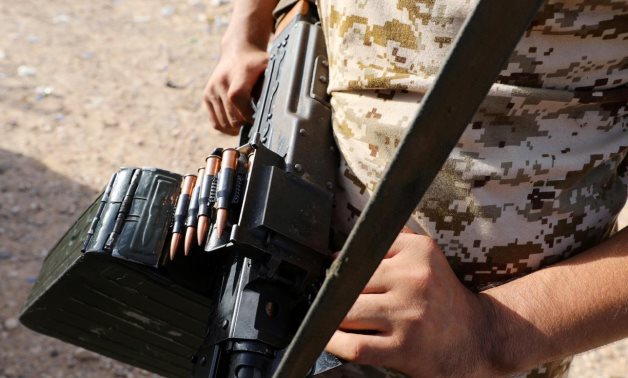
FILE PHOTO: A member of Libya's internationally recognised government forces carries a weapon in Ain Zara, Tripoli, Libya October 14, 2019. REUTERS/Ismail Zitouny/File Photo
CAIRO - 11 July 2020: The United Nations Support Mission in Libya (UNSMIL) condemned on Saturday clashes that took place in the western Tripoli suburb of Janzur between militias that are officially recognized by the Faiez Serraj-led internationally recognized government.
In its statement, UNSMIL said that it is ‘‘deeply concerned at the recent clashes that took place between criminal elements, including armed groups members, in Janzour, a civilian-populated neighbourhood in Tripoli.
These clashes frightened local residents and resulted in a number of casualties, UNSMIL said.
The Mission condemns such reckless actions, as they directly endanger civilians at a time when Tripoli is beginning to recover from a 15-month long siege.
The clashes underscore the need for the GNA to move swiftly on effective and coordinated Security Sector Reform and Disarmament Demobilization and Reintegration efforts’’, the UNSMIL statement concluded.
Neither the Faiez Serraj government nor its Interior Ministry, led by Fathi Bashagha, have yet to make a comment on the fatal incident.
The UNSMIL revealed that 10 people were killed and the bodies of dead militiamen were desecrated, stripped naked, hung up in front of their homes and paraded across Janzur. Their homes were also burnt.
The photos of their desecrated naked corpses have been widely circulating on social media.
Rival groups are reported to have clashed in the Janzour area of western Triopli on the morning of Tuesday, July 7, leaving several civilians wounded. The incident reportedly occurred at a fuel station near the Ratemi junction as residents were queuing for fuel.
A number of civilian vehicles were damaged in the exchange of small arms fire and at least one set alight, but it is currently unclear how many people were wounded in the incident.
Both sides have since disengaged but tensions remain elevated in the area and there remains a realistic possibility of further clashes in the near term.
Libya has been marred in violence between competing forces, militias and extremists since the toppling and killing of Muammar Gaddafi in 2011. The conflict now pits the Tripoli-based Government of National Accord (GNA) against the Libyan National Army (LNA), led by Field Marshal Khalifa Haftar, for control of the country.
The country’s internationally recognised government is based in Tripoli, while Khalifa Haftar, the commander of the Libyan National Army, is supported by a parallel administration based in the east.

Comments
Leave a Comment